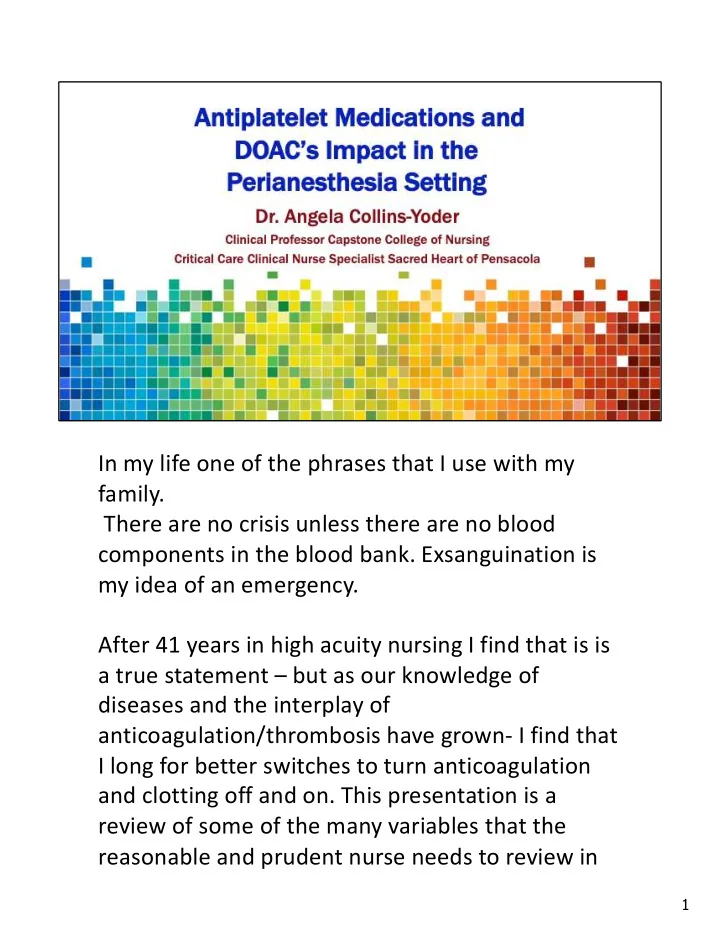

In my life one of the phrases that I use with my family. There are no crisis unless there are no blood components in the blood bank. Exsanguination is my idea of an emergency. After 41 years in high acuity nursing I find that is is a true statement – but as our knowledge of diseases and the interplay of anticoagulation/thrombosis have grown- I find that I long for better switches to turn anticoagulation and clotting off and on. This presentation is a review of some of the many variables that the reasonable and prudent nurse needs to review in 1
the Perianesthesia arena. 1
I will be clear to speak to on and off label uses of medication. 2
Take away points for you as you walk away from this presentation. 3
Evidence Based Practice And Practice Based Evidence. 4
98% of the time we want the tilt of anticoagulation so that blood will flow and carry the nutrients and by products of cellular metabolism But when there is a need for procedural intervention we need wisdom to know how to taper, stop, or continue the disruption of the coagulation cascade. 5
Which patients are now on direct acting inhibitors, vitamin K warfarin products and or antiplatelet medications is to be about 40% of persons over 50 years of age Guidelines and standards of practice for endovascular and vascular surgery advocate the use of these mediations. 6
Like any medication genetic component of pharmacogenetics is the the most powerful variable in Absorption, Distribution, Metabolism and Excretion FDA trials don’t have the numeracy to predict all the possible genetic variants with the person/ drug interaction Protein C- PROC Protein S- PROC 1 gene Factor V Leiden- F5 on chromosome one Autoimmune disease therapies Antiphospholipid syndrome and Lupus create 7
situations that cause intrinsic cascade activation Protonics versus Genomics. 7
The warnings and black boxes of these medications Which must be pondered 8
When you are considering the dose and intervals of medications in an urgent / emergent case. This can be helpful predictor of how much trouble you are in… 9
Arterial side triad that changes the forces that promote clot are trauma- platelets are typically the first responder Intrinsic aspect Venous side is stasis and that is force with greatest is viscosity so DOAC’s and Warfarin Common Pathway or Extrinsic 10
When you are taking that home medications list these clinically relevant drug interactions. 11
Most common medication to see on your list… Aspirin Each category works in a different way and has increasing potency. Clodigrel Turns off platelets for their 7 day life . 12
Platlet transfusions 13
Don’t forget these pharmacogenomics issues. 14
Resting Adhesion Activation Aggregation 15
Resting Adhesion Activation Aggregation 16
Resting Adhesion Activation Aggregation 17
Resting Adhesion Activation Aggregation 18
Know what your laboratory go to tests for platelet function are and recognize your dialysis patients have dysfunctional platelets. 19
Resting Adhesion Activation Aggregation 20
6.5 million folks have atrial fibrillation in the US 2016 numbers 21
Dabigatran is competitive, direct thrombin inhibitors. Because thrombin (serine protease) enables the conversion of fibrinogen into fibrin during the coagulation cascade, its inhibition prevents the development of a thrombus. Both free and clot- bound thrombin, and thrombin-induced platelet aggregation are inhibited. 22
RAXBIND specifically binds to dabigatran and its acylglucuronide metabolites, neutralizing their anticoagulant effect immediately after administration Binds with higher affinity than dabigatran to thrombin Has no effect on other anticoagulant or antithrombotic therapies Immunogenicity Low potential for immune reactions 4% of volunteers showed low concentrations of treatment-emergent antibodies that may persist Angioedema is always a problem with monoclonal events 23
Checklists for pondering Consistent to help you think through Especially helpful with elective cases 24
Xarelto Rivaroxaban is a selective inhibitor of FXa. It does not require a cofactor (such as Anti-thrombin III) for activity. Rivaroxaban inhibits free FXa and prothrombinase activity. Rivaroxaban has no direct effect on platelet aggregation, but indirectly inhibits platelet aggregation induced by thrombin. By inhibiting FXa, rivaroxaban decreases thrombin generation. 25
Apixaban ( Eliquis) inhibits free and clot-bound FXa, and prothrombinase activity. Apixaban has no direct effect on platelet aggregation, but indirectly inhibits platelet aggregation induced by thrombin. By inhibiting FXa, apixaban decreases thrombin generation and thrombus development. 26
Edoxaban Savaysa is a Factor Xa inhibitor. This medication requires calculation of creatinine clearance for optimal outcomes and has a black box warning about renal function. 27
Pondering Points 28
Atrial Fibrillation stroke risk 29
Change them from long acting warfarin to short acting heparin May still be relevant in mechanical heart valve and high risk series 30
Few Randomized control trials on DOAC and Anti- Platlet discontinuation 31
Highest risk : OB Neurosurgery Vascular Cardiothraic surgery 32
Time for Huddle 33
Risks and Benefits Pacemaker versus Open Heart Surgery 34
How much trouble am I in? 35
Practice of each discipline: Nursing, Medicine 36
Take Away Points Blood Management Process Current article in Critical Care Nurse Blood Flow Versus Cellular Death 37
All about the Blood 38
Going anyway>>>> 39
40
41
42
43
44
45
46
47
48
49
50
Recommend
More recommend